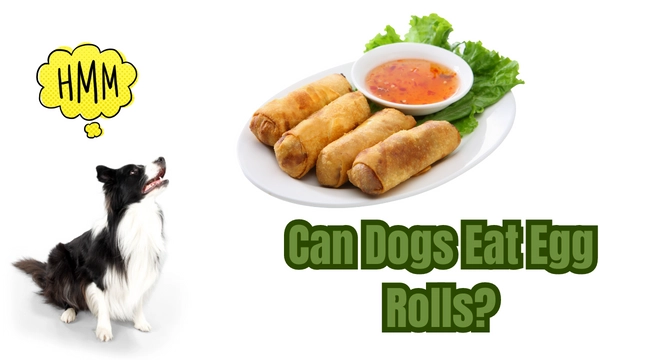
Imagine a dog, a furry friend who becomes crazy when he smells delicious food. Now picture this: a plate of delicious Egg Rolls. Can you blame your pup for not resisting such a tempting treat? The mere sight of those Egg Rolls might make your dog’s tongue tingle with anticipation. Their desire for these delectable bites is so strong that you can practically see their excitement.
But wait, there’s more to this story. Your bond with your dog is so strong that you can’t take a bite of food without wanting to share it with them. It’s a love that’s hard to put into words. And that brings us to a question: Can dogs eat egg rolls? Are these treats harmless, or should we be cautious about sharing them with our furry companions?
You might wonder whether Egg Rolls are on the menu for dogs. Canines have unique dietary needs, and it’s essential to know if these scrumptious treats could harm them. Is it a feast fit for your furry friend, or are there hidden risks? In today’s article, we’re diving deep into this topic to give you all the insights you need. Get ready to explore the world of dogs and Egg Rolls – it’s a story worth devouring. So don’t miss out – read the full article now!
What Is An Egg Roll?

Egg rolls are fried appetizers often seen on Chinese-American restaurants’ menus. It’s like a crunchy snack made by frying a thick, crispy wrap filled with chopped cabbage, pork, and other stuff. People usually dip egg rolls in duck sauce or soy sauce and eat them warm.
Even though they’re called egg rolls, they don’t actually have eggs in them. It’s funny! Nobody knows why they’re called that, but there are a couple of ideas. One story says they might be a twist on a dish known as Dan Gun. This dish has ham, sprouts, and mushrooms wrapped in a thin egg pancake. Because pancakes have eggs, maybe that’s why they got the name “egg rolls.”
To make these egg rolls, mix pork, cabbage, and carrots with ginger and garlic to create a tasty filling. Then, you put the filling in a special wrap you can buy at the store. You close it up with flour paste and fry it in hot peanut oil until crispy and delicious.
Can Dogs Eat Egg Rolls?
No, dogs shouldn’t have egg rolls. Even though we like them, they’re not safe for dogs. Egg rolls often have things that make dogs sick, like spices, onions, and garlic. Plus, egg rolls are fried and greasy, which can upset a dog’s tummy.
Eating an egg roll isn’t super dangerous for dogs, but if they eat a lot, it can be problematic because of the high salt. This can cause health problems for them.
Egg rolls are a tasty snack that’s hard to resist. You know your dog loves to share your food, but it’s best to say no to giving them egg rolls. Keep your pup healthy and happy by giving them treats and food that are safe for dogs, like what your vet recommends.
Related Post: Can Dogs Eat Tamales?
Why Egg Rolls Are Harmful to Dogs: Analyzing Ingredients and Risks
Egg rolls can be harmful to dogs due to several ingredients commonly found in their preparation. Let’s break down the ingredients in detail to understand why they might be problematic for our furry friends:
Ground Pork: While plain cooked pork in small amounts is generally safe for dogs, ground pork used in egg rolls often contains seasonings like garlic and onion powder. These seasonings can harm dogs as they contain compounds that damage red blood cells and lead to anemia.
Processed ground pork sometimes comes with added flavors like onion and garlic powder that can harm dogs. Also, if pork isn’t cooked thoroughly, it could expose your dog to trichinosis, a type of parasite infection that can cause stomach problems. Pork is quite rich and might also cause digestion issues for dogs.
Ground Ginger and Garlic Powder: Ground ginger and garlic powder contain compounds that can be toxic to dogs, especially when consumed in large amounts. Garlic, in particular, contains compounds called thiosulfates, which can damage a dog’s red blood cells and lead to hemolytic anemia. This can result in symptoms like weakness, lethargy, vomiting, and even more serious health issues.
It’s important to note that even small amounts of garlic and garlic powder can accumulate over time and potentially harm. Therefore, it’s wise to avoid feeding foods that contain these ingredients to dogs. If you’re unsure about the safety of a particular food or seasoning for your dog, it’s always a good idea to consult with your veterinarian to ensure your furry friend’s well-being.
Shredded Cabbage and Carrots: While these vegetables are not inherently toxic to dogs, they can be difficult for some dogs to digest, especially in large amounts. Additionally, cabbage and carrots might contribute to gas and stomach discomfort in some dogs.
All-Purpose Flour and Water: These ingredients are part of the mixture used to seal the egg roll wrappers. While these ingredients themselves are not toxic, the high-carb nature of the flour might not be suitable for all dogs, especially those with dietary sensitivities.
Peanut Oil: Peanut oil is often used for frying egg rolls. While a small amount of peanut oil is not likely to cause harm, the high fat content of fried foods can lead to gastrointestinal upset, and in some cases, pancreatitis, a serious and painful condition.
Egg Roll Wrappers: These wrappers are made from a mixture of flour, water, and sometimes egg. While the basic ingredients are not necessarily harmful, the wrappers are often fried, making them high in fat and difficult for dogs to digest.
Sesame Seeds (Optional): Sesame seeds are typically used as a garnish in egg rolls. These seeds are not toxic to dogs in small amounts, but they are high in fat and can be difficult for dogs to digest.
It is best to steer clear of giving dogs egg rolls or other fried foods due to the combination of ingredients they typically contain, which includes potentially toxic seasonings like garlic and onion powder, the high fat content from frying, and the possibility of digestive distress due to various components. Instead, stick to treats and foods specifically designed for canine consumption to ensure their well-being. If you’re ever unsure about whether a particular food is safe for your dog, consult your veterinarian for guidance.
Related Post: Can Dogs Eat Cheerios? Safe or Risky Snacking?
Safely Sharing Egg Rolls with Your Dog: Tips and Precautions
While feeding egg rolls to dogs is generally not recommended due to potential risks, if you’re determined to offer them a small taste, follow these precautions to do so as safely as possible:
Choose Plain Ingredients: If you decide to share a small amount of egg roll with your dog, ensure it’s made with plain, cooked ingredients. Avoid any seasonings, sauces, or spices that could be harmful to dogs.
Remove Wrappers: The fried and dense wrappers used for egg rolls can be difficult for dogs to digest and might pose a choking hazard. It’s best to remove the wrapper entirely before offering any part of the filling.
Cut into Small Pieces: Cut the plain filling into very small, bite-sized pieces to make it easier for your dog to chew and swallow.
Moderation is Key: Even if you’re offering a safe portion, remember that egg rolls are not a staple of a dog’s diet. Treat it as an occasional, small indulgence rather than a regular treat.
Watch for Reactions: After giving your dog a small piece of plain egg roll filling, observe them for any signs of discomfort, allergies, or digestive issues. If you notice anything unusual, consult your veterinarian.
Stick to Safer Alternatives: Instead of egg rolls, consider offering your dog safer alternatives such as plain cooked eggs, plain cooked meats (without seasoning), or specially formulated dog treats.
Consult Your Veterinarian: Always consult your veterinarian before introducing any new human food into your dog’s diet. They can provide personalised advice based on your dog’s specific health needs and dietary restrictions.
Remember, the health and safety of your dog should always be a top priority. If you’re unsure about whether a particular food is safe for your dog to consume, it’s best to err on the side of caution and avoid it altogether.
Related Post: Can Dogs Eat Yellow Rice?
Safe Ingredients in Egg Rolls for Dogs: What Can They Eat?
When sharing food with your furry friend, safety is a top priority. While some ingredients in egg rolls might not be the ideal choice for dogs, there are a few components that could be considered safe in moderation:
Plain Cooked Eggs: Eggs are an excellent source of protein, and many dogs enjoy them. If the egg roll filling contains plain, cooked eggs without seasoning, your dog might be safe to have a small amount.
Plain Cooked Meat: If the egg roll contains plain, cooked meat like chicken or pork without seasoning, this could be a safer option for your dog. Just make sure there are no bones and the meat isn’t seasoned or cooked in harmful oils.
Plain Cooked Vegetables: Some vegetables are safe for dogs in small amounts, such as carrots or peas. If the egg roll filling has plain, cooked vegetables, these could be considered safe, but again, be cautious about seasonings or oils.
It’s important to note that while these components might be safe in small quantities, egg rolls often include seasonings, oils, and other ingredients that can harm dogs. It’s advisable to consult your veterinarian before sharing human food with your dog, even if it seems safe. If you’re looking for suitable treats for your dog, there are many dog-friendly options available designed to meet their nutritional needs.
Related Post: Can Dogs Eat Orange Chicken?
Conclusion
To sum up, when it comes to the question “Can dogs eat egg rolls?” it’s a good idea to play it safe and not give them to your dog. Egg rolls often have ingredients that might not be good for dogs, like spices, oils, and veggies that can be harmful. Even though a little taste might not immediately hurt them, it’s better to focus on your dog’s health. Stick to treats and meals made for dogs, so they get the right kind of food. Before you let your dog try anything new, talk to your vet to make sure they stay happy and healthy.




I am very impressed to read this article.